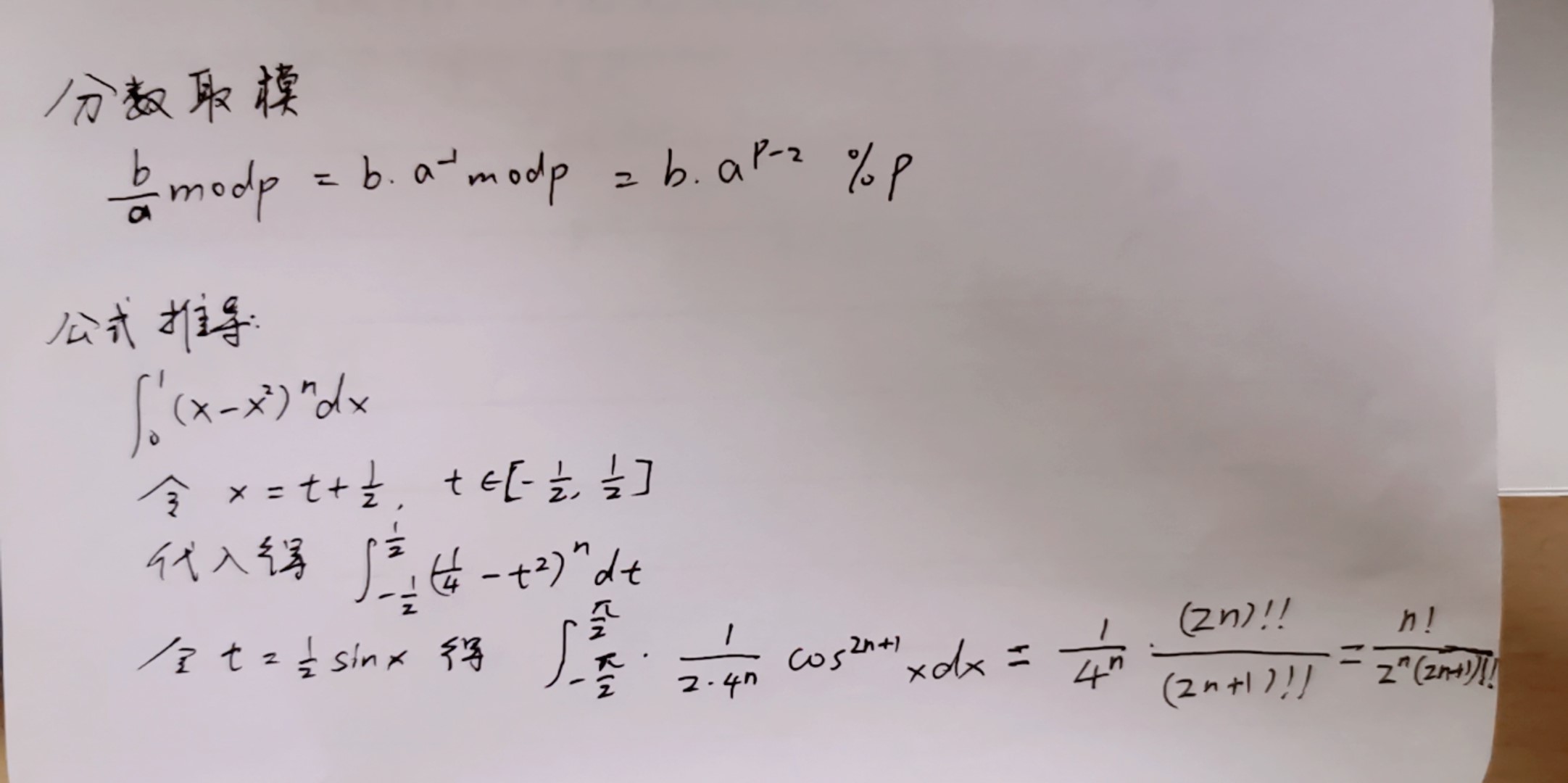mathematical knowledge
-
Whether a combined number is odd: when C(n,k) is odd, n & K = = K.
-
Rational modulus: Rational number modulo fractional modulo Fermat small theorem
Other games
1.Teacher Zhang and CAI waiwu's game
- Given a and B (a > b), what number can be obtained by a + b or a - B transformation? In fact, we can get a + x, x takes GCD (GCD (a, a - b), GCD (B, a - b)).
2.B. T-primes
- This question is really new. Let's find an integer with three factors. First, let's analyze the number A. since there is only one factor that is not 1 or a, the square of this factor must be equal to a, otherwise there can't be only one factor. Suppose a has a factor B (1 < B < a), then it must exist (1 < C < a), so that b * c = a. Therefore, only when b = c will there be a factor that is not equal to 1 or a.
- Therefore, we can make an angstrom sieve first, but this problem only asks whether it is a prime number, so we only construct is_prime is the array.
3.Problem E: Expired License
- There are two holes in this problem:
- 0.00007 * 100000 is represented by floating-point number, which is 6.99999999999991118... So it needs to be rounded.
- Note that when the input number a = b, it will be reduced to the form of 1 and 1, but in fact, 2 and 2 meet the requirements. Just such a special case.
4.B Basic Gcd Problem
- The problem is to find the number of prime factors. But you can't use the previous method of finding the prime factor, which is O ( n 3 2 ) O(n^{\frac{3}{2}}) O(n23), but the teammates came up with about O ( n ) O(n) Processing speed of O(n).
- The second step is very simple. It's just calculation c k c^k ck, k is the number of prime factors contained in n.
- The board still needs to be learned.
#include<cstdio>
#include<algorithm>
using namespace std;
typedef long long ll;
const int maxn = 1000010;
const ll mod = 1000000007;
int f[maxn];
void pre(int N) {
for (int i = 2; i <= N; i++) f[i] = 1;
for (int i = 2; i <= N; i++) {
for (int j = 2; j <= i && j * i <= N; j++) f[i * j] = f[i] + f[j];
}
}
ll mod_pow(ll x, ll n) {
ll res = 1;
while (n) {
if (n & 1) res = res * x % mod;
x = x * x % mod;
n >>= 1;
}
return res;
}
int main() {
pre(1000000);
int T;
scanf("%d", &T);
while (T--) {
ll c, n;
scanf("%lld%lld", &n, &c);
printf("%lld\n", mod_pow(c, (ll)f[n]));
}
return 0;
}
cf
1.C. Celex Update
- This question is really interesting. I first found that from (1,1) to (3,3), I found that the values of two roads are the same. Then I found that the first road was one grid earlier than the second road, and then one grid later than the second road. Then I guess the two roads are the same because of this. Then it is observed that the coordinates of X corresponding to the first path moving downward are (1,3) and the second path is (2,2). Then it is felt that as long as the sum of the corresponding x coordinates is equal, it is the same. Well, it depends on how many of these one-dimensional vectors are different from each other. The minimum is (x1, x1,... X1), and x1 * dy, the maximum is (x2, x2,... x2), and X2 * Dy, and then the answer is x2 * dy - x2 * dy + 1 = dx * dy + 1. It's a test of thinking.
2.C. Mixing Water
- I want to add an error code to remind myself that int will explode in such a place. Sometimes this priority is hard to say, so it's better to bypass it as much as possible.
- (double)(x + 1) * h, this step will explode int.
#include<cstdio>
#include<algorithm>
#include<cmath>
using namespace std;
int main() {
int T;
scanf("%d", &T);
while (T--) {
int h, c, t;
scanf("%d%d%d", &h, &c, &t);
if (h + c >= 2 * t) {
printf("2\n");
}
else {
int x = (t - h) / (h + c - 2 * t);
double tmp1 = ((double)(x + 1) * h + x * c) / (double)(2 * x + 1);
double tmp2 = ((double)(x + 2) * h + (x + 1) * c) / (double)(2 * x + 3);
if (fabs(tmp1 - t) > fabs(tmp2 - t)) {
x++;
}
printf("%d\n", x * 2 + 1);
}
}
return 0;
}
3.J Easy Integration
Formula derivation:

#include<cstdio>
#include<algorithm>
using namespace std;
typedef long long ll;
const ll mod = 998244353;
const ll mod_2 = mod - 2;
ll a[1000010] = { 1LL }, b[1000010] = { 1LL }, c[1000010] = { 1LL };
void pre() {
int N = 1000000;
for (int i = 1; i <= N; i++) {
a[i] = (a[i - 1] << 1LL) % mod;
b[i] = b[i - 1] * (2LL * i % mod + 1) % mod;
c[i] = c[i - 1] * i % mod;
}
}
ll mod_pow(ll x) {
ll res = 1;
ll n = mod_2;
while (n > 0) {
if (n & 1) res = res * x % mod;
x = x * x % mod;
n >>= 1;
}
return res;
}
int main() {
pre();
ll N;
while (scanf("%lld", &N) == 1) {
ll ans = mod_pow(a[N] * b[N] % mod) * c[N] % mod;
printf("%lld\n", ans);
}
return 0;
}